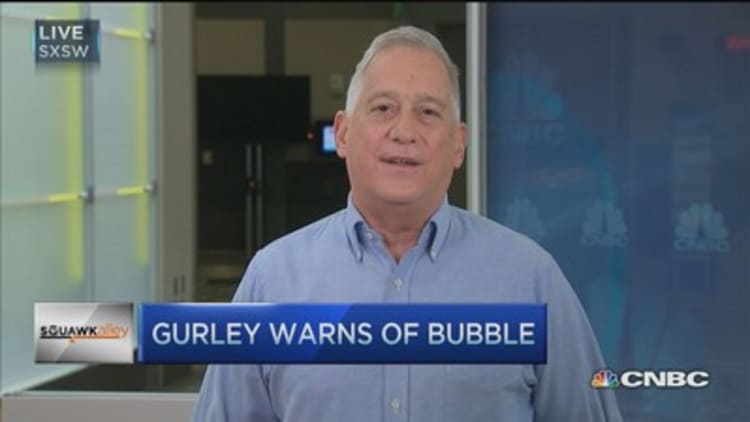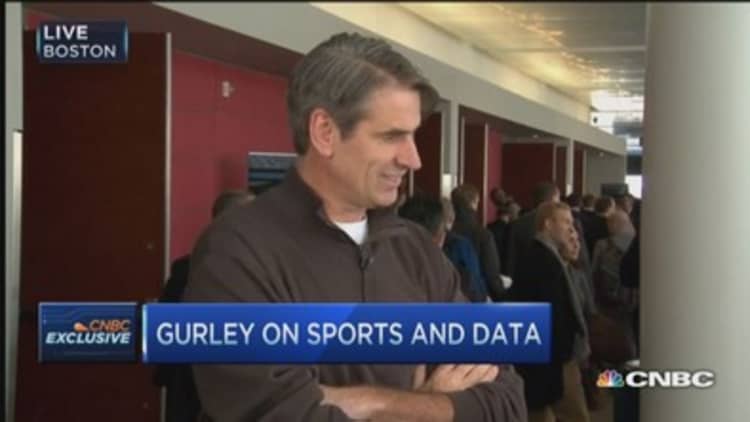
An on-stage conversation between Malcolm Gladwell and Bill Gurley became the South by Southwest version of a championship fight on Sunday, or perhaps an all-star game.
In a wide-ranging chat at the interactive festival, the pair covered the problems with U.S. healthcare, the challenge with combating hackers, sports analytics and companies that Gurley, a venture capitalist, missed out on.
Yet the liveliest dialogue in the hour-long volley centered around Uber, the controversial $40 billion ride-sharing service that Gurley and his firm Benchmark backed in its very early days.
Read MoreUber, you've been served
Gurley, sporting a University of Texas shirt in support of his alma mater and the festival's host city of Austin, has an obvious interest in talking his book. Beyond the financial windfall that's coming, however, Gurley said the societal benefits from Uber are tremendous. He cited the number of jobs created for drivers (50,000 a month), and the elimination of the need for so much driving.
The greater availability of professional drivers at affordable prices means less drunk driving, diminished needs for massive parking lots and less cruising around in circles looking for parking spots.
Yet the life-saving component is what intrigued Gladwell, the award winning author of "The Tipping Point" and "Outliers."
"Traffic fatalities continue to be a catastrophic form of death in this country," said Gladwell. "More people have died because of drunk driving than have died in every war since Vietnam."
Read MoreGladwell: A generational tipping point is coming
And then there's the elderly, which could be among the biggest beneficiaries of Uber. Gurley promised that the public will start to see more from Uber in terms of reaching out to the elderly and to kids.
Driverless cars and dead unicorns

On the next topic, their opinions diverged. Gladwell, who was doing most of the questioning but consistently chiming in with his own views, asked Gurley about the self-driving car and what it means for all the newly created Uber jobs. Does it not threaten to destroy them?
"I'm more skeptical about driverless cars than most," said Gurley. "Humans will be much less tolerant of a machine error causing a death than a human error causing a death."
In his interpretation, the first time we see a Google self-driving car cause a crash, that will represent the end of trust in the whole concept, despite the fact that humans are responsible for virtually all of today's accidents.
Gladwell wasn't buying it, suggesting Gurley just "read from the Uber press materials at hand." Machines will no doubt be responsible for crashes, he said, but if the numbers are so drastically reduced as to save thousands, perhaps tens of thousands of lives a year, wouldn't the public prefer that?
Then, a brief debate ensued over which man's argument was more rational.
Read MoreDriverless car technology coming fast
While Uber stole the show, no Bill Gurley conversation is complete without getting his thoughts on the new tech bubble. When Gladwell took questions from the audience via Twitter, that comment naturally surfaced.
Gurley has sounded off in the recent past about the problem with current burn rates and the amount of capital being thrown around, with no real view of the consequences. Investors are knocking on start-up doors offering to invest $100 million in businesses that are showing any traction, he said.
Gladwell responded this way: "You can direct some of those investors to me. I'm happy to lose money for someone."
Gurley's biggest concern is that there's so little concern, especially amongst technology's titans.
Read MoreThe unicornification of Silicon Valley continues
"There is absolutely no fear in Silicon Valley right now, a complete absence of fear," he said. And though he isn't predicting complete doom and gloom, Gurley does foresee dark times ahead for some of the billion-dollar darlings.
"I think you'll see some dead unicorns this year."


